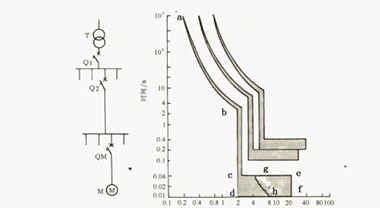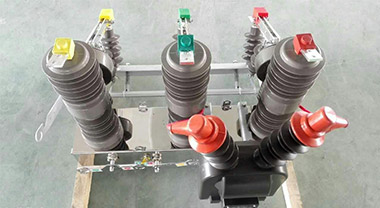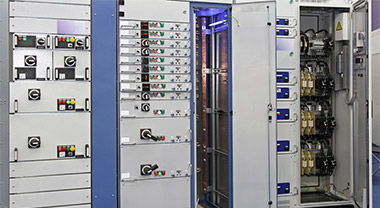Common faults and treatment methods of automatic air switches
|
Symptom |
The reason |
processing method |
|
manually broken path is not closed |
1. No voltage or undervoltage release line ring damage. 2. Storage spring deformation, resulting in closing force is reduced. 3. Reaction spring force is too large. 4. Refastenable mechanism can not be reset |
1. Check the line, a voltage is applied, or more In other coil. 2. Replace the energy storage spring. 3. Re-adjust the spring reaction force. 4. Adjustment button again contact surface to a predetermined value |
|
has a phase contacts can not be closed |
1. A general circuit breaker connected Rod Fracture. 2. May be the link between the angle repellent repellent limiting circuit breaker opening mechanism increases |
1. Replace connecting rod. 2. Adjusted to a predetermined value of the original technical conditions |
|
Shunt trip does not cause the circuit breaker breaking |
1. Shorted coil. 2. Supply voltage is too low. 3. Then buckle the contact surface is too large. 4. Loose screws |
1. Replace the coil. 2. Replace the power supply voltage. 3. readjust. 4. Tighten |
|
undervoltage tripping can not make the interruption is breaking |
1. Reaction force of the spring becomes smaller. 2. The stored energy is released, the energy storage or smaller spring break. 3. The jam |
1. Adjusting spring 2. Adjust or replace the energy storage spring. 3. Eliminating the cause for death card (e.g., rust) |
|
The starter motor Now the circuit breaker breaking |
1. Overcurrent release instantaneous tuning is too small. 2. Release some parts damaged, The semiconducting device, damage to the rubber film. 3. The reaction force spring release or rupture down |
1. Instantaneous setting value adjustment. 2. Replace the release or replacement of damaged components. 3. Replacing or replace the spring |
|
breaker is closed afterby a certain time Self breaking |
1. Overcurrent release the whole long time delay value does. 2. Thermal electric element or a semiconductor delay Change channel member |
1. readjust. 2. Replace |
|
breaker temperature too |
1. The contact pressure is too low. 2. Excessive wear or contact surfaces of the contact Adversecontact. 3. Two conductor parts connecting screws loose. 4. The contact surface oil oxidation |
1. Contact pressure adjustment or replacement the spring. 2. Contact replacement or cleaning contact surface, can not be replaced by, had to replace the entire broken mux. 3. Tighten. 4. Remove oil or oxide layer |
|
undervoltage tripping Noise Big |
1. Reaction spring too much pressure. 2. With oil core face. 3. Short ring broken |
1. readjust. 2. Remove grease. 3. Replace the armature or core |
|
Auxiliary switch nowhere |
1. The auxiliary switch movable contact death or off. 2. Auxiliary switching transmission rod breakage or off the roller. 3. Oxidation does not contact or contacts |
1. Set right or re-installed contact bridge. 2. Replacement or replacement of the auxiliary drive rod switch. 3. Adjusting contacts clean oxide film |
|
Circuit Breaker often self-breaking |
1 . Leakage current changes. 2. A drain line |
1. Send factory recalibration. 2. Looking reasons, such as insulated wire lines damaged, replacement |
|
Circuit Breaker can not be closed |
1. Damage to the operating mechanism. 2. Leakage somewhere on the line or the ground |
1. Sent to the manufacturer for repair. 2. Elimination or ground fault at the drain |




